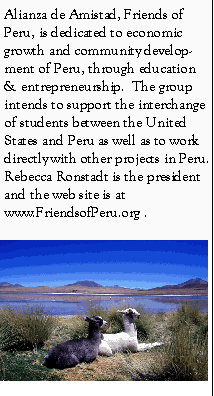 |
 |
 |
 |
 |
 |
 |
 |
 |
 |
 |
 |
 |
 |
|
|
|
|
|
|
|
|
|
|
|
|
|
|
|
|
|
|
|
RPCV Worked in Garani Stores
(continued from
page 10)
|
|
|
| | |
|
 |
|
|
|
|
|
|
|
their debts. Like in many Latin American countries,
there is definitely racism toward the indigenous
groups."
Although the Guarani villages are relatively
egalitarian, bearing a consensus-approved leader, Matta said
the society is still patriarchal. "Women don't have much say
at all, but they pretty much do everything," she said. "They
work sunup to sundown, sometimes even helping their husbands
in the fields. They seem OK with it because this is how it's
always been, and they don't have much to compare it to. They
have women's groups and sometimes get together and do
different things, but they're generally very
subservient."
|
|
|
| | |
|
|
|
|
|
The Guarani welcomed Matta, graciously inviting her
into their adobe huts for dinner. "They were always giving me
the best piece of meat or the biggest piece of cake, or they
were getting up to give me their seat," she said. "Another
volunteer had been with them in the past, and they had a
really good experience with him. So, they were excited to have
another one."
The Guarani often drank boxed white wine
with soda, mixed or unmixed pure alcohol and chicha--a beer
made from corn that is consumed in both fermented and
unfermented forms. "During the winter, some of them would
drink rubbing alcohol straight out of the bottle, or they
would mix it with cinnamon tea or boiled milk with
cinna |
|
|
| | |
|
|
|
|
|
|
|
|
mon and sugar," she said. "They were both really good,
actually."
Matta said she hopes to land a summer
internship in the Dominican Republic, working with a
micro-credit institution.
"There's something called the
Women's World Banking, based out of New York City, and they
have affiliates in different countries," she said. "They focus
on making small loans to women so they can go out and start a
business. So, I'm looking at one in the Dominican
Republic."
Retrieved from
www.athensnews.com/archives/article.php3?story_id=11505 on
3/19/03.
|
|
|
| | |
|
|
|
|
|
|
|
|
|
Resources of Possible
Interest...
|
|
|
| | |
|
|
|
|
|
 |
|
|
|
|
|
The Bolivian Studies Association at
www.bolivianstudies.org is a growing and relatively new group
representing people interested in many aspects of Bolivian
history and society.
This year's annual meeting
is scheduled for LaPaz, July 21st-25th, 2003.
Registration information is available on the groups web
site.
There are also links on the site to information
about the organization's journal, newsletter and a variety of
other resources.
The group's mission is advancement and
promotion of research and knowledge through interdisciplinary
collaboration.
|
|
|
| | |
|
 |
|
|
|
|
|
Hispanic Reading Room of The Library of Congress at
www.loc.gov/rr/hispanic/ serves as a primary access point for
research relating to those parts of the world encompassing the
geographical areas of the Caribbean, Latin America, and
Iberia; the indigenous cultures of those areas; and peoples
throughout the world historically influenced by Luso-Hispanic
heritage, including Latinos in the U.S., and people of
Portuguese or Spanish heritage.
In addition to special
on-line collections (Hispanic local history and genealogy),
information is also provided on bilingual projects, other
collections and exhibits.
|
|
|
| | |
|
|
|
|
 |
|
|
Page 1 Page
2 Page 3 Page
4 Page 5 Page
6 Page 7
Page 8 Page 9
Page 10 Page
11 Page 12 Page
13 Page 14 |
|
|
|
|
|

